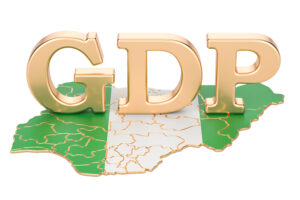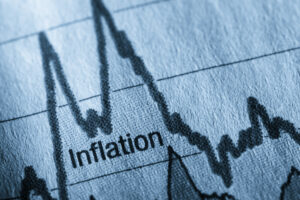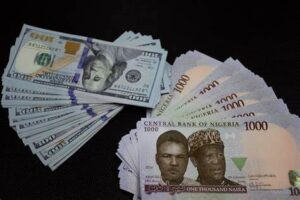CONTENT
01: MACROECONOMY
02: INFLATION
03: CURRENCY
GROSS DOMESTIC PRODUCT.
Nigeria GDP Annual Growth Rate.

Image source – istock photo
Nigeria’s economy grew at a faster pace than expected in the fourth quarter of 2023, with an annual growth of 3.46% compared to 2.54% in the previous period. This marks the 13th consecutive quarter of economic expansion and the strongest in a year, primarily driven by the non-oil sector. This sector, which recorded a growth of 3.07%, surpassed the previous quarter’s growth of 2.75%.
The services sector contributed to the majority of the GDP with a growth rate of 3.98%, mainly due to finance & insurance (+29.8%) and information & communication (+6.3%). The oil sector also experienced a sharp rebound with a growth rate of 12.1%, ending three years of contraction. The GDP increased by 12% in the fourth quarter and 2.74% for the entire year of 2023, compared to 3.10% a year earlier. The administration led by President Tinubu is targeting a growth rate of about 3.8% in 2024 and 6% or more in the coming years.
However, the economy still faces challenges due to the neglect of the manufacturing sector and ongoing issues in the agricultural sector. Nigeria is not producing enough for local consumption and export, which has resulted in foreign exchange shortages, limited job opportunities, and a high import bill. These issues have a significant impact on the country’s economy, especially considering the large population.
In summary, the FGN should emphasize tackling the issues hindering the growth in manufacturing and agriculture.
INFLATION
Nigeria’s Recent Inflation Blues.

Image source – istock photo
Nigeria is currently facing an alarming surge in inflation rates that has been difficult to control despite consistent monetary tightening measures. The country’s inflationary pressures have continued to increase, with the monetary policy rate (MPR) rising from 18.75% in December 2023 to 22.75% in February 2024 a 400-basis point increase. Several factors are contributing to the rise, including a worsening food crisis, disrupted agricultural supply chains due to insurgency-related issues, and a decline in the value of the naira.
The Nigerian economy is grappling with the impossible trinity of capital flows, independent monetary policy, and foreign exchange (FX) volatility, all while inflation continues to rise. Inflation was 28.92% in December 2023, but it has now increased to 29.90%. The National Bureau of Statistics (NBS) inflation report for January 2024 showed that food inflation had crossed 35.41%, a significant deviation from the Central Bank of Nigeria’s (CBN) monetary targets.
The Nigerian Monetary Policy Commitee held the first meeting for the year 2024 on the 27th of February, and the Committee’s decisions were centered on the current inflationary and exchange rate pressures, projected inflation, and rising inflation expectations. Members were concerned about the persistent rise in the level of inflation and emphasized the Committee’s commitment to reverse the trend as the balance of risk leaned towards rising inflation. The Committee, however, acknowledged the trade-off between the pursuit of output growth and taming inflation but was convinced that an enduring output expansion is possible only in an environment of low and stable inflation.
The January 2024 inflation report provides six key insights into the current situation in Nigeria.
- Nigeria has witnessed a 13th consecutive increase in the inflation rate since January 2023.
- The southwest region has the highest headline and food inflation rates, while the northeast has the lowest.
- Although Bauchi state has the 6th highest headline inflation rate, it has the lowest food inflation in Nigeria in January 2024, indicating that its headline inflation is not driven mainly by food inflation.
- Kogi state has the highest headline and food inflation rates in January 2024. (see table below)
Year-on-Year |
|||
| January 2023 (%) | January 2024 (%) | Points % | |
| Headline Inflation | 21.82 | 29.9 | 8.08 |
| Food Inflation | 24.32 | 35.41 | 11.1 |
| Core Inflation | 23.06 | 23.59 | 0.53 |
| Urban Inflation | 22.55 | 31.95 | 9.4 |
| Rural Inflation | 21.13 | 28.1 | 6.97 |
Month-on Month |
|||
| January 2023 (%) | January 2024 (%) | Points % | |
| Headline Inflation | 28.92 | 29.9 | 0.98 |
| Food Inflation | 33.93 | 35.41 | 1.48 |
| Core Inflation | 23.06 | 23.59 | 0.53 |
| Urban Inflation | 2.42 | 2.72 | 0.3 |
| Rural Inflation | 2.17 | 2.57 | 0.4 |
HOW TO STAY AHEAD OF INFLATION.
Are you worried about inflation and the impact it might have on your financial stability? Don’t fret, as several strategies can help you stay afloat during these challenging times. Keep reading to learn more about these effective measures that can help you navigate the inflationary period with ease.
Control your spending:
- Create a budget: Track your income and expenses to identify areas where you can cut back. Consider using the 50/30/20 rule, allocating 50% of your income to needs, 30% to wants, and 20% to savings and debt repayment.
- Reduce discretionary spending: Look for ways to cut back on non-essential expenses like entertainment, dining out, and subscriptions. Consider cheaper alternatives or explore free activities.
- Shop strategically: Plan your grocery shopping and stick to a list, taking advantage of sales and coupons. Buy in bulk only for items you use frequently and can store properly.
- Negotiate bills: Contact your service providers (cable, internet, phone) to see if you can negotiate a lower rate.
Grow your income:
- Increase your earning potential: Look for opportunities to increase your income through freelancing, a side hustle, or asking for a raise at your current job.
- Explore different investments: Consider investing in assets that may outperform inflation, such as real estate (with caution and professional guidance), stocks, or certain commodities. However, remember that investments come with risks, so be sure to do your research and seek professional advice before making any decisions.
Protect your savings:
- Minimize debt: High-interest debt can significantly impact your finances during inflation. Focus on paying off existing debts and avoid taking on new ones unless absolutely necessary.
- Diversify your savings: Don’t keep all your savings in a single account. Consider inflation-protected savings options or diversify into different asset classes to mitigate risk.
Additional tips:
- Stay informed: Keep yourself updated on economic news and trends to make informed financial decisions.
- Seek professional help: If you’re struggling to manage your finances during inflation, consider talking to a financial advisor for personalized guidance.
Finally, it’s important to diversify your investments and consider reallocating your portfolio to focus on more inflation-resistant industries, such as healthcare, utilities, and consumer staples. By taking a proactive approach to managing your finances during inflation, you can help ensure that you and your family remain financially secure.
Contact us today to learn more.
CURRENCY.
Black Market Dollar to Nigeria Exchange Rate Today.

The unofficial black market exchange rate of dollars to naira has become a vital economic indicator in Nigeria’s current financial climate. Towards the end of February, the rate of the naira continues to present a challenging scenario, with prices ranging from N1,800 – N1,490 per US dollar for selling, and N1,790 – 1,500 per US dollar for buying in February.
The black market, also known as the parallel market, operates unofficially, providing individuals and businesses with an alternative to accessing the official market, which is often hindered by limitations such as scarcity, restrictions, and regulatory hurdles. This unregulated sector is highly influenced by daily fluctuations in supply and demand, as well as factors such as inflation, political instability, and economic policies.
In contrast to the black-market rates, the Central Bank of Nigeria (CBN) has set the official exchange rate at N1,582.94 per US dollar as of February 26th, 2024. This rate establishes a considerable premium in the parallel market, indicating a divergence between the official and unofficial markets. The parallel market premium serves as a measure of confidence in the naira and the effectiveness of CBN’s policies.
The widening gap between the black market and official rates raises concerns about the overall economic stability. Investors, businesses, and individuals must exercise caution while navigating these rates, comprehending the potential impact on their financial transactions and decisions.
As the black-market exchange rate fluctuates daily, stakeholders in the Nigerian economy must stay informed about these dynamics to make well-informed decisions. The disparity between the official and parallel market rates underscores the importance of monitoring economic indicators for a comprehensive understanding of the financial landscape.
SOURCES: centrumfinanceltd, Proshare.com, Allmedia24.com, Tradingeconomics.com
DISCLAIMER
This publication is produced by Centrum Finance Company Limited solely for the information of users who are expected to make their own investment decisions without undue reliance on any information or opinions contained herein. The opinions contained in the report should not be interpreted as an offer to sell, or a solicitation of any offer to buy any investment. Whilst every care has been taken in preparing this document, no responsibility or liability is accepted by any member of the Company for actions taken because of the information provided in this publication.

